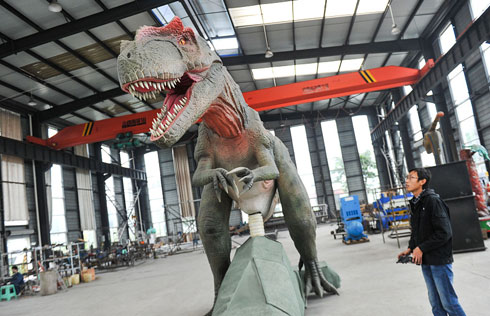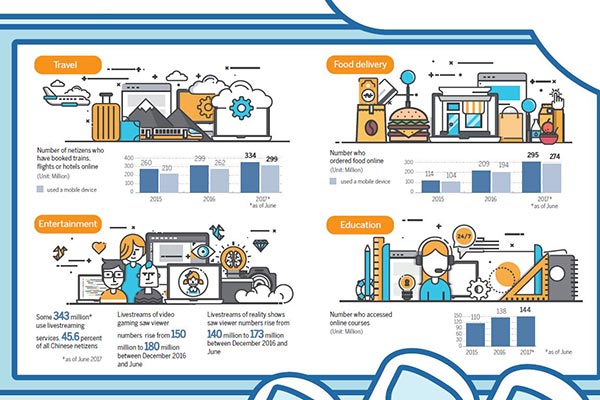Didi Chuxing speeding ahead
 |
|
Didi Chuxing, the country's largest ride-hailing platform, is ranked the second-most valuable startup, which has inspired other Chinese startups to venture out beyond their home-turf to search for opportunities overseas. [Photo/VCG] |
Its success underlines how the mobile internet technology is spawning a tide of innovation in China and how thousands of startups are scrambling to jump onto the bandwagon of digital economy.
According to global consulting firm CB Insights, China is now home to more than 50 unicorns - startups valued at more than $1 billion each - among 214 unicorns worldwide. The country has the largest number of unicorns outside the United States and Didi is ranked the second most valuable startup, after its rival Uber Technologies Inc.
Jonathan Woetzel, a director of the McKinsey Global Institute and lead author of the report "China's digital economy: a leading global force", said China has one of the most active digital-investment and startup ecosystems in the world.
"Beyond scale, it is the enthusiasm for digital tools among China's consumers that will support growth, facilitate rapid adoption of innovation, and make Chinese digital players and their business models competitive," Woetzel said.
According to him, China's digital globalization is only just getting started but is gathering momentum, with local companies scrambling to venture out beyond their home-turf to search for opportunities.
 |
|
Cheng Wei, founder and CEO of Didi Chuxing. [Photo/VCG] |
One of such typical players is Didi. Sitting on an abundant cash reserve and powered by over 7,000 employees, the Beijing-based company is making stronger and faster moves on overseas expansion as well as business extension into next-generation technologies, including new energy vehicles and driverless cars.
When Didi acquired global ride-sharing giant Uber's China services a year ago, it secured absolute dominance in the Chinese market. As of now, more than 450 million users and 21 million drivers are using services from this on-demand mobility company.
And the fight is coming to the overseas markets where the company said it is confident of competing with Uber. It is stepping on the accelerator of global expansion, chiefly by partnering with a number of ride-hailing companies in foreign countries.
The company set up an international business department in February. Cheng Wei, founder and CEO of Didi, said: "We are seeking to be the biggest operator of automobiles in the world."
In August, Didi announced it would invest in Dubai-based ride-hailing platform Careem, a week after it announced cooperation with Estonia-based Taxify, as the company steps up its push into markets such as the Middle East, Africa and Europe.
It also allied with Japan's Soft-Bank to inject around $2 billion into its existing partner Grab, and cooperated with Brazil-based taxi on-demand service 99, Uber's major US competitor Lyft, global car-rental firm Avis Budget Group, and India's ride-hailing company Ola.
Most of these platforms are fierce competitors of Uber in their respective regions. Building local partnerships with these influential local partners, which is a faster way than starting from scratch, has given a strong impetus to Didi's global presence.
Zhang Xu, an independent smart-transportation analyst, said whether Didi can take on Uber in overseas markets will depend on how quickly it can integrate its resources with its foreign partners.
"So far, Didi's ties with them have been capital-oriented, but deeper collaboration can be expected on technologies, products and services," he added.
On top of tapping into international markets, Didi is also actively promoting the application of new-energy vehicles. It has formed a joint venture with the Global Energy Interconnection Development and Cooperation Organization earlier this year to roll out charging networks for electric vehicles, or EVs.
The move came after the Beijing-based startup signed up with National Electric Vehicle Sweden AB, which bought the assets of bankrupt Saab Automobile AB in 2012, to jointly develop EVs.
According to the International Energy Agency, also known as IEA, more than 750,000 EVs were sold worldwide last year, compared to 547,220 sold in 2015. China has surpassed the US to be the largest carrier of electric vehicles, accounting for 40 percent of the EVs sold in the world, twice as big as the US.
"The future of transport is new energy vehicles, and ride-sharing will be a key link in promoting new energy on the road," said Cheng. "With the advance of new energy and new transmission technology, we have the chance to build a global 'internet' of energy."
Apart from EVs, Didi is ratcheting up resources into artificial intelligence, as self-driving vehicles are widely seen as the next frontier of innovation.
In November, the company announced the opening of its main US research facility in Mountain View, California, to facilitate the growth and expansion of its Bay Area-based team. The new campus is located in the heart of Mountain View on National Avenue, with offices covering 36,000 square feet and capacity for more than 200 employees.
This is part of the Didi Labs, a laboratory unveiled in March this year. Bob Zhang, CTO of Didi Chuxing, said at the campus opening: "It's been an exciting year for Didi Labs. Our talented team is growing fast and making important contributions across our key tech areas, from smart-city transportation management, AI ride-matching, to security and new product innovation."
Having hands in an array of transportation services, including taxi, premier cars, mini bus, car rental, hitch and investments in bike-sharing, Didi's latest push in self-driving cars highlights once again its ambitions of building a one-stop platform to meet people's various demands.
"We are seeing a great revolution which integrates the internet of information, the internet of energy, and the internet of transportation. Didi hopes to play an important part in promoting such integration so as to make cities better," Cheng added.























